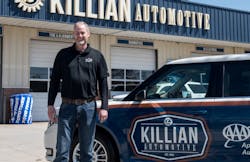Let’s look at two different scenarios.
Scenario #1: Douglas County was a small, remote region tucked away from the big city. Keller’s Professional Auto & Diesel was one of two shops in town. President Tom Keller was seen as the go-to authority on auto repair.
Scenario #2: Killian Automotive was the premiere Ford specialty shop in town. Owner Tim Lanier made sure his team was staffed by the area’s top Ford technicians. His operation was poised for huge growth.
The key word in both of these cases? Was.
Every business owner starts out with a brand he or she is passionate about, but inevitably—as both of these shops quickly found out—not everything goes according to plan. Trends come and go, the economy fluctuates, one generation replaces the next.
Is the market right for you? Are you targeting the right customers? Do they identify with your brand promise? If your answers to these questions are “no,” then it’s time to take a step back—to pivot your business model.
This article features two shop operators that were able to maintain their core values during a shift, yet projected new images that fit into their changing surroundings. They detail how you can always keep in step with your customers.
SHOP STATS: KELLER'S PROFESSIONAL AUTO & DIESEL Location: Three locations in Colorado Staff Size: 28 Annual Revenue: $4 million
Breaking Down Barriers
When the population in Douglas County grew, a small MSO had to differentiate itself from a sudden influx of competition
The Vision
In 1989, John Miszuk joined Big O Tires as a store manager. Little did Miszuk know that within 10 years, that company would blow up from six to 380 franchise locations in 19 states.
But back in 1999, when the growth was still modest, Miszuk knew the company culture was shifting away from what inspired him.
“It started out as a small company, but then became corporate,” he says, “in how things were done and how customers were treated. No matter how I wanted to individually do something right, I was limited by the policies in place for what I could and couldn't do. And that's where people walked away with a bad taste in their mouth.”
That’s why he left the corporate culture in 2003 to embark on something new with Tom Keller, who had just opened Keller’s Professional Auto & Diesel in the greater Denver area. Tucked away in the small city of Parker, Colo., Keller’s was experiencing sizable growth as one of two shops in town, thanks to its at-home atmosphere—essentially, the opposite of “corporate,” Miszuk, who serves as Keller’s general manager, says. Keller’s strived to be humble and honest in Douglas County, which had few auto repair options.
Thanks to a good reputation and little competition, by 2012, Keller’s had added two nearby facilities in Centennial and Aurora.
The Roadblock
In 2010, just before the Centennial location was added, Douglas County experienced the beginning stages of a huge boom. According to the State Demography Office, the population age over 60 increased 46 percent between 2010 and 2015, while the total population increased 12 percent. By 2017, the population had reached 336,000.
And as the population grew, so did competition in all three of Keller’s cities.
“They actually did a moratorium on building permits because the town was getting so big they couldn't keep up with everything,” Miszuk says. “It seems like there’s a different building every day.”
The effect on Keller’s was immediate. While the original Parker location was hitting 600 cars per month before 2010, the average monthly car count dropped as Firestone, Tires Plus, Christian Brothers Automotive and a stampede of independents rolled into town.
No longer the area’s lone option, Keller’s leadership knew it had to find new, creative ways of selling a personalized experience the competition couldn’t offer.
“From this side of the counter, when people come in, you have to knock that barrier down,” Miszuk says. “You have to make them feel like they're in good hands.”
The Pivot
While Keller’s mission of being a down-to-earth operation hasn’t changed, Miszuk says that image took on a new light with competition in mind.
“The big box stores bring a corporate mentality with no personalized service,” he says. “Our objective now is to take reduced car count and offer something more. When a guy walks through the door, we call him by the first name and make him glad to be there.”
Miszuk trained service managers to hold this mentality, noting what separates Keller’s from the competition at daily meetings, and carefully hiring employees passionate about working in a non-corporate culture.
“Everyone I’ve ever hired, I say, ‘As far as I’m concerned, you're the owner,’” Miszuk says. “They should feel like the customer is their personal customer, and that satisfying them is the only goal.”
The operation pushed that attitude through marketing by partnering with organizations like AAA Colorado to host special events and automotive repair campaigns, including a series of TV spots where Keller’s preached the importance of safety inspections.
Miszuk personally oversaw the company’s Facebook page and digital advertising. On top of Facebook ads and direct mailers that pushed the company’s fleet of free loaner vehicles and 50,000-mile warranty (perks not offered by the competition, Miszuk notes), Keller’s Facebook page is full of funny memes and promotions for area nonprofits, helping to solidify the shop’s local mentality, Miszuk says.
Keller’s also increased its presence in the shops’ three different communities, supporting sports programs and philanthropic efforts.
“There are three separate communities, three different economies, three different walks of life we need to understand,” Miszuk says. “We want to be part of those communities. When people move in, they see us.”
The New Model
After all of its efforts, Miszuk says Keller’s made up losing 30 percent of its average monthly car count by raising ARO by over $100.
Instead of shrinking the employee base, Miszuk instead says the operation focused on high-ticket items. Shifting away from a high volume of lube work, technicians instead focused on improving courtesy inspections so service advisors could sell more work. Because of that, Keller’s was able to increase its annual revenue 10 percent year-over-year to $4 million.
“We are trying to take what we have now and do it much better,” Miszuk says. “And five years from now, we’ll probably have to change again. As cars become different, as there are more millennials, things will change. And we’ll be ready.”
SHOP STATS: KILLIAN AUTOMOTIVE Location: Canton, Ga. Staff Size: 16 Number of Lifts: 13 Average Monthly Car Count: 70 Annual Revenue: $2.2 million
Two Steps Back
When work dried up at his specialty shop, Tim Lanier knew he had to restructure his team and rebrand his operation.
The Vision
As a fresh graduate from a Georgia technical school, Tim Lanier was taken aback when his boss at an area Ford dealership asked him: “Ever pulled a transmission before?”
Lanier was hesitant at first. Wasn’t this job too big for him as an entry-level technician? What did he know about Ford transmissions? Couldn’t a Ford specialist take it on?
But sure enough, after being pushed by his service manager, Lanier gave it a go. And the result?
“I fell in love with it,” he says.
For the next eight years, Lanier built Ford transmissions and fostered a passion for the automaker that he carried with him into his business, Killian Automotive, which he opened in 2002. In Canton, Ga., an area full of Ford drivers and fleets, business boomed immediately, allowing Lanier to spread his specialty operation to three locations by 2008.
With a reputation as a passionate Ford repairer, Lanier attracted many Ford technicians from surrounding dealerships and built a workforce that, 16 years ago, ran the gamut on Ford work.
“We were really unique in 2002,” Lanier says. “As a Ford Lincoln Mercury specialist shop, we offered something nobody else had.”
The Roadblock
In 2008, when the Great Recession hit and the housing market dried up, so did Killian’s reliable Ford base. The shop’s fleet work from builders, plumbers and electricians disappeared overnight.
“We had a car repoed out of the parking lot that we had just done $1,200 of work on,” Lanier says. “Things really went south quickly.”
In that year alone, car count dropped by 130 vehicles per month. In a tougher market with less available fleet work, Lanier quickly realized there was no longer a base to power his three-shop operation. An eager new business owner, Lanier had expanded Killian Automotive too quickly and needed a new, condensed approach.
“Sometimes you have to take a couple steps backward, give yourself time to re-evaluate things,” he says. “If it means swallowing your pride to become smaller to eventually get bigger, that’s the better thing to do.”
The Pivot
Lanier moved all three Killian locations into one 12,000-square-foot facility, with the goal of streamlining operations and refocusing his staff to concentrate on work outside Ford.
While Lanier had built his staff with A-techs from Ford dealerships, he decided to go after C-techs he could mold to fit the business’s rebrand. After his lead tech was injured, Lanier promoted him to shop foreman and tasked him with overseeing these lower-level technicians.
Lanier immediately added two quick lube bays and pushed a revamped courtesy inspection process that emphasized checking bolts, belts and hoses more stringently. Lanier developed a system where lube techs would rate safety items on a scale of 1 (stable) to 5 (severely weared). Killian’s service advisors would mention 1s and 2s, but heavily push customers to address 4s and 5s.
This refined, minor shift brought in a steady flow of work at Killian for the first two years of the recession, which justified hiring some technicians with specialties outside of Ford. With the move, Killian was soon pulling in more Dodge work, and eventually worked its way up to servicing Asian and European models.
With the shop foreman reviewing everything on the front end of repairs, Lanier then established a quality control position to ensure keys were ready to be handed back to customers.
“He’s ensuring quality on back end,” Lanier says, “making sure the inspection is done, the repair is done properly, the processes are being followed through with.”
The New Model
The internal shift empowered Lanier to push a new brand to the public. No longer a Ford specialty shop, Lanier became AAA affiliated and pushed Killian’s all-around approach through billboards, local magazine advertisements, Facebook and direct mailers.
Through those outlets, Lanier pushed a new logo and building upgrades. Instead of the traditional Ford image that drove business for six years, Killian Automotive now had a “modern, rustic feel,” Lanier says. The shop’s website carries that image as well, housing several service videos and articles covering all the different makes Killian services.
Lanier’s shop foreman now not only oversees the front end of repairs, but also manages the shop’s apprenticeship program, which keeps a steady flow of lube techs at Killian. Thus, the culture has experienced a cyclical shift, as seasoned technicians are coaching new employees on Killian’s broadened outlook, setting up Lanier’s shop for the future.
“I’ve always been a planner—probably to a fault,” Lanier says. “But it’s helped. You make mistakes, and you learn from your mistakes, and it causes me to be more diligent with planning and performing that due diligence. And you learn how to not make those mistakes over again.”

